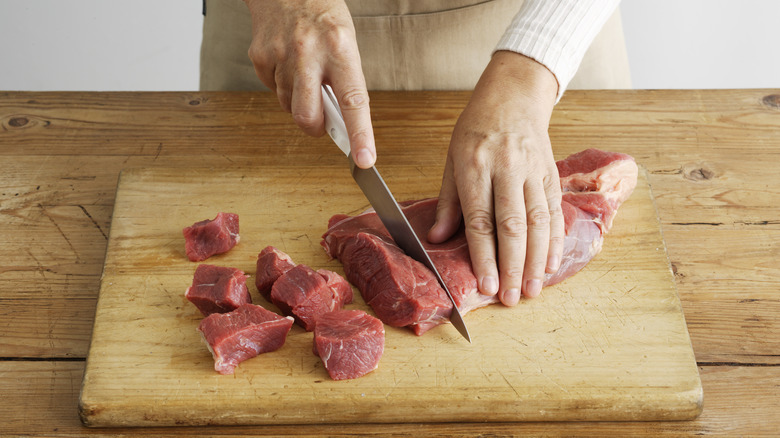What Happens To Your Blood Pressure When You Follow The Carnivore Diet
There are plenty of diets floating around, but one that seems to resurface regularly is the carnivore diet. The carnivore diet's fame took off in 2019, after being featured in a book by former orthopedic surgeon Shawn Baker and endorsed by popular podcaster Joe Rogan (via WebMD). Known for being highly restrictive, the carnivore diet expects followers to eliminate all carbs. And "all" means "all," including fresh produce since many fruits and vegetables contain sugars or starch.
Proponents of the carnivore diet rave about the way it makes them feel and perform. In a 2021 study in Current Developments in Nutrition, a full 95% of survey participants who adhered to the carnivore diet reported feeling satisfied with the health benefits. Yet before you toss all your cereals, breads, fruits, and veggies out the door, you may want to think twice.
For all its trendiness, the carnivore diet has its downsides. And one of them is that your blood pressure levels may not react positively to cutting out all carbs and eating snacks and recipes made up of mostly animal-based ingredients. In fact, you may find it hard to fight existing hypertension (high blood pressure) if you're indulging like a carnivore and eating lots of animal fats and processed meats.
The link between saturated fats and blood pressure
What's wrong with munching on animal fats for almost every meal if you're trying to control your blood pressure? The main problem is that animal fats are saturated fats, which have a tendency to stick around and potentially lead to cholesterol buildup in your arteries. This opens the door to rising cholesterol numbers and hypertension.
Dietitian Kate Patton admits that the carnivore diet can result in predictable weight loss and manageable sugar levels (via the Cleveland Clinic). However, she warns that the carnivore diet can wreak havoc on the human body. Explains Patton, "If you have a pre-existing chronic condition, like high blood pressure, high cholesterol, any history of stroke or other cardiovascular diseases, you should definitely not try this diet . . . this diet can make things worse with all that protein and fat."
The American Heart Association suggests eating no more than around 120 calories of foods high in saturated fat each day to reduce your risk of developing cardiovascular disease. But when you're loyally following the carnivore diet, nearly everything you consume will contain high levels of saturated fat. That means it's tough to follow heart-healthy guidelines if you're sticking with a carnivore diet and lifestyle.
Sneaky sources of hypertension-promoting sodium
When it comes to carnivore eating, saturated fat isn't the only blood pressure-elevating concern. Sodium tops the charts, too. Because a typical carnivore recipe can feature processed meats like bacon and sausage, the recipe's sodium levels can be extremely high. Excessive sodium consumption isn't a friend to anyone concerned about keeping their blood pressure numbers in check.
In a 2018 study in the Journal of Clinical Hypertension, researchers identified compelling links between eating too much sodium and experiencing heightened blood pressure. This led them to conclude that overindulging in salt could have adverse health effects, including compromising an individual's risk of dying earlier than expected. Another trial from 2023 (via JAMA) showed that when participants' sodium levels decreased, their blood pressure decreased, too. In just one week, three-quarters of adult participants who followed a low-sodium diet reduced their blood pressure by an average of 8 millimeters of mercury (mmHg).
To be fair, many cuts of meat available in the carnivore diet don't naturally contain sodium. Nutritional facts from the U.S. Department of Agriculture show that a 360-gram serving of T-bone steak offers 241 milligrams of sodium. For comparison, that's just over 10% of the 2,300 milligrams of sodium that the U.S. Food and Drug Administration recommends per day for healthy adults. Consequently, it is possible for carnivore diet followers to refrain from overindulging in sodium by being careful during their food preparation and seasoning sessions, as well as limiting processed meats.
Modifications to the traditional carnivore meal plan
This doesn't mean that you have to rule out the carnivore diet completely if you want to give it a spin. Some people swear that the diet helps them keep their bodies fitter, and a few nutritional experts support the idea that the carnivore diet can have positive outcomes and applications in very specific individual circumstances.
For example, the carnivore diet could be right if you're battling constant joint pains and are seeking food-based relief. In a 2024 Forbes article, registered dietitian Chrissy Arsenault agrees that although it's limiting, the carnivore diet isn't necessarily off the table for everyone and could be appropriate for those with inflammation. "These fatty acids fight off inflammation in many different ways and reduce the production of pro-inflammatory cytokines," Arsenault notes when discussing the fatty acid makeup of a typical carnivore diet meal plan.
Just know that your blood pressure might not respond favorably if you go full-fledged carnivore. And if you like the idea of cutting carbs, eliminating sweets, and increasing protein but prefer a little moderation, you might want to adopt a carnivore diet to suit your needs. For instance, as explained by Healthline, the diet doesn't offer any plant-based nutrients or fiber, both of which can help with hypertension. Therefore, you might want to bring some low-sugar produce into the nutritional mix to boost the variety of your carnivore diet experience.



